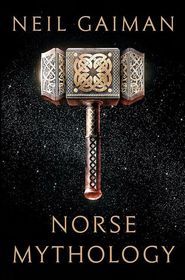Helpful Score: 1
I tried to read the tales of the Norse Gods as told to us by Edith Hamilton. I could not get into the stories. Perhaps it was because I felt like Ms. Hamilton was talking AT me instead of TO me; perhaps it was because they were confined to the end of "Mythology", after we had already read about the major Greek and Roman gods, and the minor Greek and Roman gods, and the really minor Greek and Roman gods, and the second cousins and casual acquaintences of the really minor Greek and Roman gods ...
Noted fantasy writer Neil Gaiman has decided to take his turn at telling us the tales of the Norse Gods. While he may also be talking at us, he has adopted the persona (in spirit and tone, at least) of a trusted elder telling us tales that were told to him many years ago, rather than as a college professor earning their paycheck by providing lectures to the undergraduates.
Like me and so many of us, Mr. Gaiman was first exposed to the gods of the Scandinavian people courtesy of their modern-day adaptations by Stan Lee, Larry Leiber, and Jack Kirby of Marvel Comics. (Those who automatically picture Chris Hemsworth and Tom Hiddleston in their minds when "Asgard" is mentioned indirectly share this experience.) As such, Mr. Gaiman can identify with us and relate the original stories in ways that the modern audience can understand and appreciate.
Special mention must be given to his final chapter on Ragnarok, the twilight of the gods. Mr. Gaiman cleverly alludes to many ways that modern man has been warned that he may destroy the earth in describing how the final war between the beings of Norse mythology may witness their world's end. Could it be nuclear war / nuclear winter? Perhaps global warming? While these modern concepts are never mentioned, it does not take much of an imagination to draw a parallel between the book's descriptions and those that have been described in the Science section of the newspapers.
As always, Mr. Gaiman has excelled. His newest effort is definitely worth a look.
RATING: 5 stars
P.S. I loved the short exchange in which Sif questions why Thor automatically assumed that Loki was responsible for the loss of her hair. Thor replies "... when something goes wrong, the first thing I think of is, it is Loki's fault. It saves a lot of time."
DISCLOSURE: I was awarded a free copy of this book in a random draw. No requirement of a review was made, let alone any conditions on the tone / content of a review, however, it was suggested that "an honest review would be appropriate".
Noted fantasy writer Neil Gaiman has decided to take his turn at telling us the tales of the Norse Gods. While he may also be talking at us, he has adopted the persona (in spirit and tone, at least) of a trusted elder telling us tales that were told to him many years ago, rather than as a college professor earning their paycheck by providing lectures to the undergraduates.
Like me and so many of us, Mr. Gaiman was first exposed to the gods of the Scandinavian people courtesy of their modern-day adaptations by Stan Lee, Larry Leiber, and Jack Kirby of Marvel Comics. (Those who automatically picture Chris Hemsworth and Tom Hiddleston in their minds when "Asgard" is mentioned indirectly share this experience.) As such, Mr. Gaiman can identify with us and relate the original stories in ways that the modern audience can understand and appreciate.
Special mention must be given to his final chapter on Ragnarok, the twilight of the gods. Mr. Gaiman cleverly alludes to many ways that modern man has been warned that he may destroy the earth in describing how the final war between the beings of Norse mythology may witness their world's end. Could it be nuclear war / nuclear winter? Perhaps global warming? While these modern concepts are never mentioned, it does not take much of an imagination to draw a parallel between the book's descriptions and those that have been described in the Science section of the newspapers.
As always, Mr. Gaiman has excelled. His newest effort is definitely worth a look.
RATING: 5 stars
P.S. I loved the short exchange in which Sif questions why Thor automatically assumed that Loki was responsible for the loss of her hair. Thor replies "... when something goes wrong, the first thing I think of is, it is Loki's fault. It saves a lot of time."
DISCLOSURE: I was awarded a free copy of this book in a random draw. No requirement of a review was made, let alone any conditions on the tone / content of a review, however, it was suggested that "an honest review would be appropriate".




